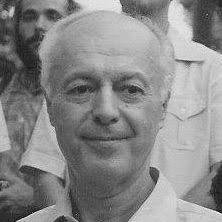
Last Update
April 25, 2021
Organisation
Unknown
Gender
Male
Ethnic Group
Persian
Religoius Group
Muslim
Province
Tehran
Occupation
Other
Sentence
Execution
Status
Released
Institution investigating
Unknown
Charges
Collaboration with anti-revolutionary groups
Date of Birth
8/2/1917
Place of Birth
Sari
Ehsan Tabari Released
Ehsan Tabari became interested in Marxism at a young age because of his acquaintance with Taqi Arani, the intellectual, and founder of the Tudeh Party. Tabari was one of 53 people arrested and imprisoned in 1937 during the reign of Reza Shah Pahlavi for his links to Taqi Arani. He was sentenced to four years in prison and exile. Tabari was released from prison in September 1941 and later participated in the establishment of the Tudeh Party.
Tabari was in charge of the Rahbar (Leader) newspaper and other publications of the Tudeh Party.
In 1948, after a failed assassination attempt on Mohammad Reza Shah Pahlavi, the Tudeh Party was outlawed and Tabari was sentenced to death. He left Iran and escaped to the former Soviet Union. He studied and graduated from the Moscow Academy and worked for Radio Moscow under the pseudonym "Parviz Shad." He moved to East Germany after nine years. Tabari studied in Berlin and later received a doctorate in philosophy. He taught at German universities for many years.
Tabari gradually became fluent in Arabic, Russian, German, English, French, and Turkish, and specialized in the history of philosophy and literature. He published the political magazine Donya, was an author for Peyk-e Iran Radio and published many books.
On April 18, 1979, after the Islamic Revolution and along with many other leaders of the Tudeh Party, Tabari returned to Iran and continued his political activities and intellectual leadership of the party. But in a few years, the leaders of the new Islamic Republic began suppressing other political groups and parties, including the Tudeh Party . Tabari was arrested and imprisoned on April 27, 1983.
He was tortured during interrogations. On May 6, 1983, only nine days after his arrest, Tabari's forced confession to deny his ideology and the Tudeh Party's views was broadcast on Iranian state television. He said in the televised confession that he regretted his past actions and beliefs.
The 67-year-old Tabari was forced to announce in front of a television camera that he had converted to Islam in prison after reading books by Muhammad Husayn Tabatabai and Morteza Motahhari. Tabari suffered a stroke in prison four days after his forced confession was broadcast, but the interrogations and torture continued.
The book "Confessions of the Leaders of the Tudeh Party of Iran" quotes Ehsan Tabari: "I stutter because of a stroke and my memory and presence of mind have dwindled. Therefore, I need to read from my writing, for which I apologize to the esteemed viewers."
Finally, after two years of temporary detention which was accompanied by severe torture, the First Branch of the Islamic Revolutionary Court of Tehran sentenced Tabari to death on charges of "membership in the Tudeh Party and attempting a coup d'etat" on September 11, 1983.
According to the revolutionary leader Ali Akbar Hashemi Rafsanjani, after Tabari was sentenced to death, Rafsanjani said he visited Supreme Leader Ayatollah Ruhollah Khomeini and interceded on Tabari's behalf. He was released from prison on Khomeini's consent and held under house arrest after his release. Tabari died in hospital on April 29, 1989.
"The Collapse of the Traditional System and the Rise of Capitalism," "Disappointed Intellectual," "The Birth and Evolution of Revolutionary Theory," "The First Decade" and "Iranian Society under Reza Shah Pahlavi" are among the many books written by Tabari. His works also include the poetry collections "Dreamy Song," "Among the Pebbles and Diamonds," "By the Whispering of Autumn" and "Plea," and the novels "Torture and Hope," "Freed Gods," "Farhad IV," "Boroumand Family" and "Panjameh.”